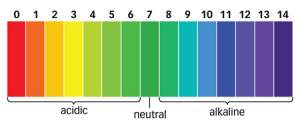Effects of Soil pH on Plant Growth
At a glance, soil pH can seem like a topic best left to scientists. However, for gardeners wanting to create optimal conditions for plants to thrive in their garden, it’s well worth exploring. Once you’ve gained a basic understanding of the concept, it’s surprisingly simple to apply it to making practical improvements to your garden.
What is soil pH?
Soil pH is a measure of soil acidity or alkalinity, with values on a scale of 0.0 (most acidic) to 14.0 (most alkaline). Acidic soils have a low pH value (less than 5.5), while alkaline soils have a high pH value (more than 8.0). Soils with a pH between these values are considered to be more or less neutral.

Why is soil pH important in gardening?
A soil’s pH is directly connected to its concentration of major nutrients, as well as its composition of microelements available for uptake by plants. When soil pH is extremely high or low, the plants growing in it may suffer from nutrient deficiencies or toxicities.
When soil pH is identified, imbalances can usually be corrected over time. This is done by working in particular materials that change the overall chemical composition of the soil. For soil that’s too acidic, lime is often used for this purpose, while gypsum (along with other measures such as growing legumes in crop rotation) is used for overly alkaline soil.

What are the effects of soil pH on plant growth?
In soils that are highly acidic or highly alkaline, key minerals and trace elements may not be available in sufficient quantities for plants to grow properly. Extremes in pH levels can also mean high concentrations or more accessible forms of minerals such as aluminium, which can be toxic to plants.
 In addition, pH levels affect the microbial processes that allow organic matter to decompose and deliver nutrients to the soil. In general, a neutral pH provides the best conditions for microbial action that makes nitrogen, sulfur and phosphorus available in the soil.
In addition, pH levels affect the microbial processes that allow organic matter to decompose and deliver nutrients to the soil. In general, a neutral pH provides the best conditions for microbial action that makes nitrogen, sulfur and phosphorus available in the soil.
While most plants thrive best in neutral soils, certain species have a preference for more acidic or more alkaline conditions, depending on their nutritional needs. To find out more about this, use our handy soil pH guide, which outlines the preferred pH range of popular garden plants.
How do I check soil pH in my garden?
Measuring pH is done by running a chemical test on a sample of soil. The good news is that you can do this yourself at home using a Manutec Soil pH Test Kit, available from Garden Express. This test is a simple and accurate way to find out the pH of your garden soil and potting mix.
There’s no need to fear soil science. Make friends with it, grab a testing kit, and get to know your soil. Your garden will thank you!








Comments are closed.